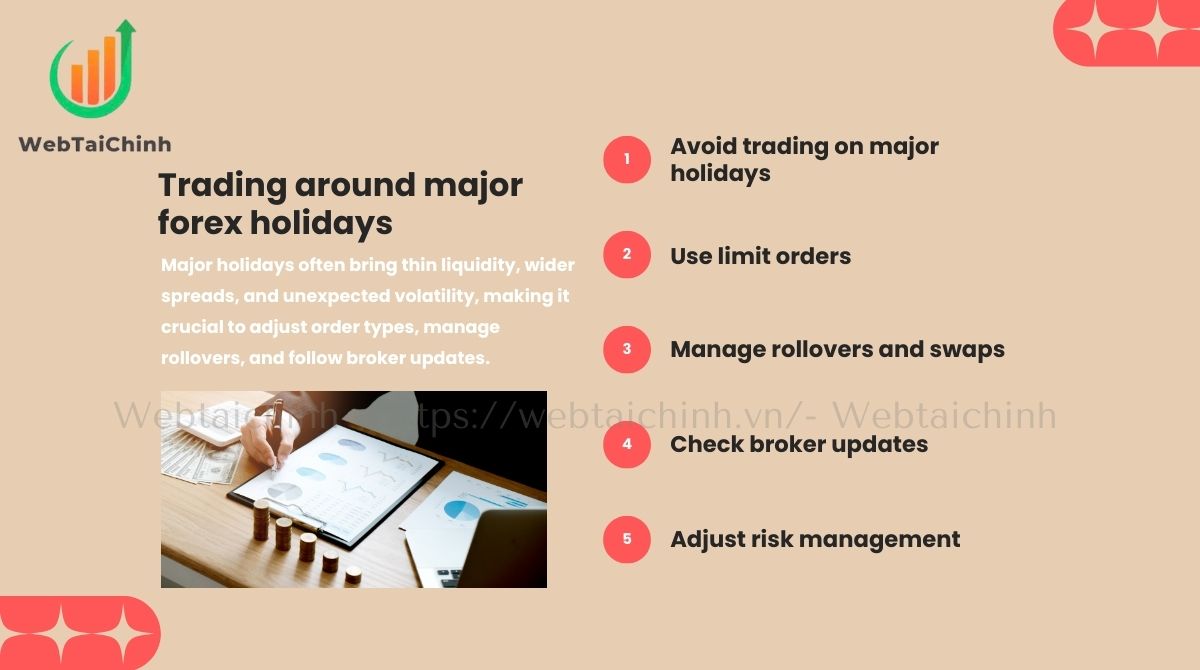Physical Address
304 North Cardinal St.
Dorchester Center, MA 02124
Physical Address
304 North Cardinal St.
Dorchester Center, MA 02124

For traders wondering what holidays is the forex market closed, the answer isn’t always straightforward. Spot forex technically runs 24/5, but global holidays in major financial centers like the US, UK, Japan, and Australia significantly affect liquidity and spreads.
FX futures, on the other hand, follow strict exchange holiday schedules. Knowing these dates and their impact helps traders prepare for thin markets, avoid unnecessary risks, and adjust strategies effectively.
Key takeaways:
“Closed” in forex trading varies depending on the type of market and context:

The impact of these closures is noticeable in order execution, with potential price gaps, increased spreads, and altered rollover (swap) timings. For instance, CME FX futures’ schedules provide clear examples of how US holidays translate into market halts or adjusted hours. Traders often receive broker notifications about restricted trading, underscoring the importance of awareness.
For traders asking what holidays is the forex market closed, the answer depends on each region’s official calendar. In 2025, major events like New Year, Christmas, Golden Week in Japan, or China’s Lunar New Year will either fully close FX futures or severely thin spot forex liquidity.
Knowing these dates in advance helps traders anticipate wider spreads, adjust positions, and prepare for potential volatility across USD, EUR, JPY, AUD, and other key currency pairs.
Partial closures may refer to shortened trading hours, while “very thin liquidity” indicates lower trading volumes and wider spreads, making executions more challenging.
Traders often ask what holidays is the forex market closed, since forex technically runs 24/5. In reality, liquidity drops sharply or markets shut entirely during major global holidays such as New Year, Christmas, and Thanksgiving in the U.S., Golden Week in Japan, or Lunar New Year in Asia.
Knowing these closures and thin-liquidity periods helps traders anticipate risks, avoid costly mistakes, and plan strategies more effectively.
| Date (UTC / ET) | Holiday name | Affected regions | Spot FX status | FX futures status | Notes |
| Jan 1 (Wed) | New Year’s Day | US, EU, UK, JP, AU, CN | Very thin / Impaired | Closed (CME) | Global holiday, wide spreads, no US futures trading |
| Jan 20 (Mon) | Martin Luther King Jr. Day | US | Thin | Closed (CME) | USD pairs less liquid, futures halt |
| Feb 8–14 (Sat–Fri) | Lunar New Year | CN, HK, SG | Very thin (CN/HK) | Closed (local) | CN/HK markets shut, CNH liquidity low |
| Feb 17 (Mon) | Presidents’ Day | US | Thin | Closed (CME) | Light USD liquidity |
| Apr 18 (Fri) | Good Friday | US, UK, EU, AU | Very thin | Closed (CME, EU) | Global Christian holiday, most Western futures shut |
| Apr 21 (Mon) | Easter Monday | UK, EU, AU | Thin | Partial/Closed | GBP/EUR liquidity low |
| Apr 29 – May 5 | Golden Week | Japan | Very thin (JPY) | Closed (some) | Major JPY liquidity drain |
| May 5 (Mon) | Early May Bank Holiday | UK | Thin | Partial/Closed | GBP liquidity reduced |
| May 26 (Mon) | Memorial Day / Spring Bank Holiday | US, UK | Thin | Closed (US) | USD & GBP pairs impacted |
| Jun 9 (Mon) | Queen’s Birthday | Australia | Thin (AUD/NZD) | Normal | Sydney session affected |
| Jun 19 (Thu) | Juneteenth | US | Thin | Closed (CME) | US holiday |
| Jul 4 (Fri) | Independence Day | US | Very thin | Closed (CME) | Sharp drop in USD liquidity |
| Sep 1 (Mon) | Labor Day | US, CA | Thin | Closed (CME) | USD & CAD pairs affected |
| Sep 15 (Mon) | Respect for the Aged Day | Japan | Thin (JPY) | Normal | Lighter Tokyo session |
| Oct 1–7 (Wed–Tue) | China Golden Week | China, HK | Very thin (CNH) | Closed (local) | CNH illiquid, Asia FX muted |
| Nov 27 (Thu) | Thanksgiving Day | US | Very thin (USD) | Closed (CME) | Often pre-holiday volatility |
| Dec 25 (Thu) | Christmas Day | Global (US, UK, EU, JP, AU) | Impaired | Closed (CME) | Global low liquidity, wide spreads |
| Dec 26 (Fri) | Boxing Day | UK, EU, AU | Very thin | Partial/Closed | GBP, EUR, AUD pairs thin |
While the forex market operates globally, the impact of holidays differs from one region to another. Each country’s banking system and exchange schedule can create unique liquidity challenges, affecting specific currency pairs.

Understanding these regional nuances whether it’s the U.S. shutting FX futures on federal holidays or Japan’s Golden Week draining JPY liquidity helps traders anticipate volatility and adjust their strategies accordingly.
Broker-specific restrictions may vary by region, often reflecting local holiday observances.
Bank holidays cause a chain reaction in forex liquidity because major financial institutions close their dealing desks. This leads to a sharp decline in market participants and available liquidity, which has several effects:
For instance, in 2025, spreads have historically expanded during New Year and Christmas periods times when traders must exercise caution due to increased risk of erratic price moves.
Knowing what holidays is the forex market closed is only the first step traders also need practical strategies to navigate these periods. Major holidays often bring thin liquidity, wider spreads, and unexpected volatility, making it crucial to adjust order types, manage rollovers, and follow broker updates.
By preparing ahead of time, traders can minimize risks and trade more confidently during challenging market conditions.

For example, around Christmas and New Year in 2025, traders should anticipate altered rollover timings and potential widened spreads, adjusting strategies accordingly.
While spot forex generally remains open 24/5, liquidity may be so thin that effective trading is near impossible, and FX futures exchanges may fully close.
Yes, but expect very thin liquidity and wider spreads; many brokers may restrict available instruments or impose close-only sessions.
Yes, exchanges like CME close FX futures markets on US federal holidays.
To manage risk during low liquidity periods, brokers may limit trading to closing positions only, preventing new trades.
Some key releases are postponed, while others may proceed; traders should confirm schedules to avoid surprises.
New Year, Christmas, Thanksgiving, Good Friday, and major national holidays in key financial centers have the strongest effects on liquidity and volatility.
Rollover timing may shift, often moved earlier to pre-holiday days, and swaps can be larger due to triple swap adjustments.
Understanding what holidays is the forex market closed is essential for every trader who wants to avoid unnecessary risks and plan smarter strategies. Holidays like New Year, Christmas, or regional bank closures often reduce liquidity, widen spreads, and alter rollover timings.
By preparing in advance and following reliable resources such as webtaichinh, you’ll be better equipped to manage volatility and maintain consistency in your trading journey.
Web Tai Chinh is a portal that updates news and information related to finance quickly and accurately, helping users have an overview before investing, clearly understanding concepts and terms related to Finance. Explore more insights in our Forex category, start your FX trading journey today with the right partner for long-term success.
📞 Contact: 055 937 9204
✉️ Email: webtaichinhvnvn@gmail.com
📍 Address: 13 Ho Tung Mau, An Binh, Di An, Binh Duong